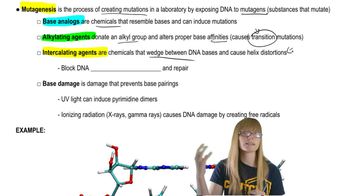Go to the website http://www.ncbi.nlm.nih.gov/omim and enter 'Lynch syndrome' in the Search box at the top of the page. From the list of options given, select '#120435—Lynch Syndrome.' Use the information you retrieve to answer the following questions. What are the approximate rates of cancer that develop in people carrying a mutation of one of these genes?
Table of contents
- 1. Introduction to Genetics51m
- 2. Mendel's Laws of Inheritance3h 37m
- 3. Extensions to Mendelian Inheritance2h 41m
- 4. Genetic Mapping and Linkage2h 28m
- 5. Genetics of Bacteria and Viruses1h 21m
- 6. Chromosomal Variation1h 48m
- 7. DNA and Chromosome Structure56m
- 8. DNA Replication1h 10m
- 9. Mitosis and Meiosis1h 34m
- 10. Transcription1h 0m
- 11. Translation58m
- 12. Gene Regulation in Prokaryotes1h 19m
- 13. Gene Regulation in Eukaryotes44m
- 14. Genetic Control of Development44m
- 15. Genomes and Genomics1h 50m
- 16. Transposable Elements47m
- 17. Mutation, Repair, and Recombination1h 6m
- 18. Molecular Genetic Tools19m
- 19. Cancer Genetics29m
- 20. Quantitative Genetics1h 26m
- 21. Population Genetics50m
- 22. Evolutionary Genetics29m
19. Cancer Genetics
Overview of Cancer
Problem C.12
Textbook Question
Genetic counseling has not been discussed in this chapter, but it is a service provided by trained professional counselors who also have detailed knowledge of medical genetics, as described in Application Chapter A. Genetic counselors provide details about gene mutations and have knowledge of most of the details of diseases associated with genetic abnormalities. With regard to genetic testing to identify one's personal risk of cancer, what are the three or four topics you think are most important to be able to discuss with a genetic counselor?
 Verified step by step guidance
Verified step by step guidance1
Step 1: Understand the role of a genetic counselor, who provides information about gene mutations and genetic diseases, helping individuals assess their personal risk based on family and medical history.
Step 2: Identify the importance of discussing family history of cancer, as this helps determine inherited risk factors and whether genetic testing is appropriate.
Step 3: Discuss the types of genetic tests available, including what mutations or gene changes they detect, their accuracy, and limitations.
Step 4: Explore the potential outcomes of genetic testing, such as positive, negative, or uncertain results, and what each means for personal and family health management.
Step 5: Consider the implications of test results on medical decisions, psychological impact, privacy concerns, and possible preventive or therapeutic options.
 Verified video answer for a similar problem:
Verified video answer for a similar problem:This video solution was recommended by our tutors as helpful for the problem above
Video duration:
4mPlay a video:
Was this helpful?
Key Concepts
Here are the essential concepts you must grasp in order to answer the question correctly.
Genetic Testing and Mutation Analysis
Genetic testing involves analyzing DNA to identify mutations that may increase the risk of diseases like cancer. Understanding how mutations affect gene function helps assess personal risk and guides decisions about prevention or treatment.
Recommended video:
Guided course

Chi Square Analysis
Inheritance Patterns and Risk Assessment
Knowledge of inheritance patterns (e.g., autosomal dominant, recessive) is essential to estimate the likelihood of passing mutations to offspring. This helps in evaluating family history and personal cancer risk.
Recommended video:
Guided course

Organelle Inheritance
Implications of Test Results and Counseling
Interpreting genetic test results requires understanding their medical, psychological, and ethical implications. Genetic counselors help individuals make informed choices about surveillance, lifestyle changes, and family planning.
Recommended video:
Guided course

Induced Mutations

 9:51m
9:51mWatch next
Master Cancer Characteristics with a bite sized video explanation from Kylia
Start learningRelated Videos
Related Practice
Textbook Question
480
views
